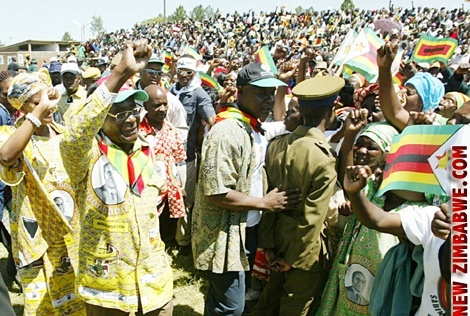
ZANU PF “youths” are on the prowl. Moving around neighbourhoods door- to-door style and in their numbers, they demand the names of those eligible to vote from households so that they can update their party’s records, and for the purposes of “issuing party cards and marking registers at future neighbourhood party meetings”.
The Zanu PF jingles are receiving airplay ad nauseum; political violence is on the increase with Zanu PF, the police and the state media laying the blame on the MDC; members of the opposition and civil society are being arrested with some being charged with treason; and a sustained, rancorous smear campaign of Zanu PF’s opposition is in top gear in the state media.
Unmistakably the tell-tale whiff of yet another election is in the air. Zanu PF has clearly decided that it has made the most of the time it bought to pause and reorganise itself courtesy of the Global Political Agreement, and is in a haste to campaign for and hold elections. This election mode is maybe the clearest indicator yet to Zimbabweans and Sadc — guarantor of the GPA — that Zanu PF has virtually thrown the accord out the window.
Zanu PF, as voters have repeatedly found out, does not take rejection lightly as most recently proved by the 2008 presidential run-off which turned bloody after the MDC’s Morgan Tsvangirai had outpolled President Robert Mugabe. It would appear in Zanu PF’s version of democracy the people have a choice: They can only vote for Zanu PF!
While there is a predilection for violence in Zimbabwean politics, it is Zanu PF that has made it its stock-in-trade; the motif that stands out in each and every one of its election campaigns. It is little wonder that Tsvangirai has since blamed Mugabe for the resurgence of violence.
Last week Sadc facilitator South African President Jacob Zuma condemned the politically motivated violence and intimidation that has flared up since — revealingly —Zanu PF launched its 2011 election campaign despite there being no clear indication as to when the elections would be held.
- Chamisa under fire over US$120K donation
- Mavhunga puts DeMbare into Chibuku quarterfinals
- Pension funds bet on Cabora Bassa oilfields
- Councils defy govt fire tender directive
Keep Reading
And in what has also become a familiar refrain, Zuma earlier in the week dispatched his facilitation team to Zimbabwe yet again, to check on the progress in implementing outstanding GPA issues and assist in the drafting of a clear election roadmap. Given the lack of progress after several such visits, Zimbabweans can at best only be guardedly optimistic. The team will have to contend with a party — Zanu PF —which is on record bragging that the country is a democracy merely because it has held elections regularly and on time!
Hopefully, the recent outbreak of violence will serve as the direst warning yet that Zimbabwe is not out of the woods yet and the spectre of a bloody and disputed election still looms large. The crucial reforms thus need to be implemented without any further ado.
Local government ministers from Sadc who were attending a forum in Luanda, Angola, were this week reported to have reiterated the need to “immediately lift illegal sanctions imposed on Zimbabwe”, saying they were hindering the country’s development.
While it is Sadc’s prerogative to speak out against sanctions, it should be even more vocal about the non-negotiable nature of far-reaching reforms as outlined in the GPA as anything less is a recipe for another Zimbabwe crisis.
Without a doubt, Zanu PF’s shenanigans in regard to the above is tantamount to a middle-finger gesture to the GPA it signed — ostensibly in the national interest.











